
Retreat Room at Ravenstone Retreat in Sunshine Valley, BC
Filled Up Cup Episode 2 with Marion Baker
Ashley: Thank you so much for joining me today on the Filled Up Cup podcast. For anybody who’s not aware, Marion Baker is a Registered Counselor who specializes in Transpersonal Psychology, which is the marriage of spirituality and psychology. And then after so many years of struggling with being single, she now helps other women who were unsuccessful in relationships and want to learn how to do something differently. And you actually wrote a fantastic book that I own, about all of this.
Marion: Yay. Somebody bought my book.
A: Do you still host workshops or do you just take one-on-one clients?
M: Just for during covid I’m taking one-on-one clients. Depending on how things go then I’ll start taking in-person clients and doing workshops at my home.
A: Marion lives out in Sunshine Valley, BC, Canada, which is this beautiful little area sort of nestled in the woods and hosts retreats at her home. And actually once, you know, the world’s goes back to normal. You host other people in retreats if they want to as well. Is that correct?
M: That’s right. Yep. So it’s Ravenstone Retreat and Ravenstone Counseling.
HOW FAMILY SYSTEMS PLAY A PART IN CHOOSING A PARTNER
A: Can you share a little bit about your backstory, about how, you went from being single to finding your Mister., Mr. Right?
M: Sure. And I was thinking, thinking about this and it, can I actually even back track that question a little bit, because it’s giving you a bit of back story will actually help give you some context for what it is that I’m talking about. Because I, I work with family systems theory, which gives us a better understanding about who we are, based on what our family system dictates, like the rules of our family systems and the culture and the family that we come from, because what happens is there’s a lot of unspoken and spoken rules in our families. And so we either rebel from, or cater to those rules.
A: Yeah. I can imagine.
M: Yeah so I grew up in a family with four girls and my sisters are, were born in the forties and fifties. And I was born in the sixties. There’s a decade between the youngest sister and me. So you know, the family message at that time was, you know, women don’t get education, they just grow up and they get married, have 2.5 children in the house with a white picket fence. And, you know, you pay off your home. Then, if you’re lucky you get to go on a holiday. My sisters grew up with poodle skirts and bobby socks and I grew up in the sixties, which was like free love the Vietnam war. What’s going on in the US and, and like everybody was on acid and it was, it was just a free for all. And so, you know, I actually tried living by the family rules. I got married when I was 19 and it lasted for all of 50 weeks. I didn’t even make it to a year before I went. Yeah. I just don’t think I can do this. I don’t think I can.
A: I just really like, am so shocked when people do get married really young that it does last because at 19, I just don’t know that we have the mental capacity to really make those choices.
M: I know. Oh, like our cerebral cortex isn’t even fully developed yet. So it’s kind of a miracle then that people’s marriages last that long. So, yeah, after that, I just struggled through relationships, like never, never really wanting marriage, never wanting kids. And so, but you know, I was the master of the two year relationship and, you know, some people would call me a serial monogamist until I hit, I don’t know, 40. And then all hell broke loose because I suddenly decided, okay, well, I might want to try this marriage thing. Not because my family is dictating it this time, but because I think I want to take relationships to the next level. Never, ever actually having one that what I would’ve called successful. So yeah, you can imagine how that went. It wasn’t pretty.
MISCONCEPTIONS ABOUT THE OLDER SINGLE WOMAN
A: And I think there’s this attitude of, oh once you do reach older, then it’s like, You become desperate instead of really just wanting to find the right person or becoming too picky instead of really just knowing what you want. So I think that there’s all these like misconceptions put on older women once we do start to think about dating.
M: Right, right. Yeah. It’s true. And, like my goal then became a marriage as opposed to what you just said is like finding the right person and having a more casual attitude towards it. So I went through tenure, like almost 10 years of internet dating, just like, you know, talking, you know, checking out a thousand profiles and of those thousand profiles, you get to connect with a hundred people and of those hundred, then you get to actually talk to 10 and then of those 10, you get to meet one, you know? And so it’s this huge exhausting numbers game. So, yeah, it wasn’t a lot of fun and that was the most horrible dating time of my life because I had this hidden agenda.
A: And I think a lot of people do that. A lot of people when they’re looking for somebody, it is, I either want to have kids. I want to get married. It has, we all have this idea in our head. So it is really hard not to focus on the idea instead of the bigger picture.
M: Right yeah finding your person rather than this and having the relationship look like the relationship wants to look, instead of it having to be marriage, like to like, why was, why did I, why did I need to be married? I was in my forties, you know, there was no reason for it.
A: And I think also as women, we, if you aren’t married, society puts this like, well, what’s wrong with you? So I think we were taught, you know, you’re pretty, you’ll find Mr. Right. Or Mr. Right will come and pick you. And we really get taught the princess story that if we don’t finish it, then it is what does that mean for me? Why wasn’t I picked why wasn’t it, all these things. So I do think that that’s normal. That you’d be like, why am I not married.
M: Right. It’s true. Yeah. I think Disney is, I mean, as much as I love Disney movies, like I think it’s the worst thing that ever happened to little girls, because all they see is like this prince and princess fall in love, but then there’s this big struggle to get back to the love and then they get married and, and the key is like they live happily ever after it. No, you know, then the problems just begin. There’s no such thing as happily ever after and rainbows and unicorns, it’s just, and others like marriage or relationships are just another set of problems and a different set of problems than being single, well sort of because I mean, for me, I wouldn’t say that that was true because I was so blind to what I thought would be what the relationship would be. So what I was choosing going in, I would have been like, whoa, you know, at 19, going into marriage is like, oh yeah, no, this isn’t what I thought.
A: Oh, no, a hundred percent at 19. Once you fully have an idea or like, as a grownup, I feel like once our eyes are fully open and our brains are fully developed, then it’s like, we know after being single for a while, if I’m going to make this sacrifice or make this change, it’s like at that point, then I’m choosing you.
M: Right. And it actually took me three years of counseling before I could fully consciously. I mean, for the most part, not fully, but for the most part consciously go in and into a relationship going, okay, so this isn’t all, you know, hearts and flowers and roses. This is going to be me having to relate to you in a different way than I’ve ever related to before, because what I was doing before wasn’t working. So now what do I do.
A: Well, and good for you for acknowledging and knowing that you would need counseling to come up with that and that you couldn’t solve all your problems yourself. You weren’t going to the problem to for the solution.
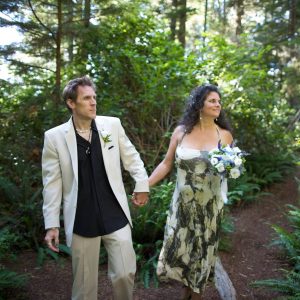
Marion and Neil
MEETING HER HUSBAND
M: Right? Right. I tried that way too many times. It was like, I’m bashing my head against this wall too, too much. So what can I do instead?
A: And what happened then to help you finally make that relationship work aside from counseling? Like what was it, how did you guys meet?
M: We actually met, we worked together when I was in my early twenties and we dated for a year then. He’s always been a homebody and I was like a party girl. Like I was a total orangutang so, he said he would have married me then. And I know like he said, you know, I’m you were the only woman I ever cried over.
A: Ah, that’s so sweet he was so connected to his emotions at that point.
M: Yeah. And so, you know, 25 years later, we meet up again on Facebook. Not in any internet dating site, but just Facebook. It’s like, Hey, there’s Neil. And he is like, whoa, here’s trouble but still we, yeah, we got back together and now we’re married 11 years.
A: Congratulations. And sometimes people I do think it’s like, once you’re ready what is meant to be well, we’ll sort of align in that sense that I think that had you guys maybe tried or stayed together, or if he had proposed back then that it wouldn’t have worked and you wouldn’t have had 11 years under your belt. So I do think like, you know, not necessarily everything happens for a reason because I think when we think of bad things that just doesn’t feel aligned but I think in the cases like this, I think sometimes when things are works out with the right timing.
M: Yes. For sure. Yeah. I had to go and get my yayas out and then settle down a bit. And yeah, I agree with you about the timing and the alignment cause what actually happened right before I came across him again, was that I finally bashed my head against one too many dating site walls and just went okay. I waved the white flag and I was like I surrender to be like okay, I’m turning this one over to you spirit. It’s like, I’m taking off my profile, out of all the dating sites and if you want me to be with somebody, you bring them to me because I’m tired of working this hard for it, so then yeah, three months later we were dating.
A: How long were you guys in the dating mode before you guys decided to take the plunge and get married?
M: Not very like there was like three or four months. Like we were in at that point, I do not recommend that to anybody even, even now. I mean, had I not known him from before and I knew his family and I knew who he was and I knew his, you know, even as reputation going through life, which is an important part, If that was the reason that I made the decision so quickly. Cause he is, he told me, you know, tell me, say the word and I’ll marry you.
A: Well that, I think sometimes when, you know, you know, my grandparents went on three days and essentially got married on their third date and they were married for decades.
M: Wow.
A: Well, I think sometimes when the, like, I don’t necessarily think that you should rush to the alter and see what happens, but I think when you do know, you know, And also too, it’s like, you have to take a leap sometimes. So if you guys are both on the same page and ready to leap at the same time, why not see what happens?
M: Right. Yeah. And he said that he never thought he would get married. Like he wasn’t in, in any rush to get married. But because I, you know, I was as old heartbreak, he was like, he was in, so I was like, okay, that’s good.
A: Well, and I think sometimes maybe when the pressure of I have to get married and that becomes, I want to get married. It’s such a big shift too, because I think for people that notoriously don’t necessarily care about it, if your partner does, then it definitely, why wouldn’t you.
M: Right. Yeah exactly.
DATING DURING A PANDEMIC
A: What advice do you have for people right now? Like we’re all pretty much been at home on and off for two years. I know I’ve been single for almost a decade for people that are trying to, you know, put it back out there again and consider dating, especially in the state of the world right now. What would you tell them?
M: Well, it’s interesting because what I’m watching some friends of mine still date, right? They’re still on the internet. They’re still dating. They’re still meeting people. What I’m kind of watching. And is that the process seems to be happening faster. I’m watching my friends eliminate people faster because to actually have to date in a pandemic world, you really gotta want it. And so, you know, you can FaceTime until you’re blue in the face, but eventually you’ve got to meet. And so people are, my friends are, you know, maybe meeting outside and going for a walk or taking those kinds of precautions but you only want to do that so many times before you can say, okay yeah, I think let’s give us a good try. And so if it’s not really worth it for you to go and date like that, cause like it’s easy to go on nice dinners and just enjoy your time. Right during the pandemic, like you, you can’t do that. So you’ve just got to go and find out who this person is, you know, there’s no movies to distract you, there’s no dinners. I had one friend who was feeling down, because of course she was going through guy after guy after guy, which is, and she’s in her early fifties. She said, you know, I just don’t know what to think. I said, just think that this is what dating in your fifties in a pandemic is like.
A: Well, and I think realistically it’s any age, in a pandemic is that’s kind of what it’s like. I would say the only plus side, and granted I’m not on dating sites, but I would say the plus side of it is you also get to sort of see where they stand a little bit faster on things. In the beginning of any relationship there’s a little bit of, you know bullshitting of, oh, I love going outdoors or I love hiking or whatever the case may be when it’s like, really all you want to do is maybe have a glass of wine and watch Netflix.
M: Right
A: Also like you kind of see where people’s core is. It’s like if you get on the talk of vaccine or vaccine passports that you can kind of see faster, those people aligned with your beliefs.
M: Absolutely.
A: If they maybe weren’t quarantining when we had to keep our safe six or things like that, that you kind of get to see, you know, is this going to be something that is going to divide us in six months or a year or whatever, depending on how long this goes on or about other issues, how you guys would communicate about the differences of opinions in the beginning might save you a lot of trouble or, you know, sink the relationship.
M: Yeah, I agree. Yeah. It’s like, do our values align and like, cause one of my friends is more of a conspiracy theorist and she’s not vaccinated. And so she’s going to find out pretty quickly who, who is and who isn’t just by her being transparent about who she is. And then yeah, that kind of eliminates 90% of the people on the planet that would have been a waste of her time to pursue anyway.
A: Yeah. It’s nice to have that sort of right off the bat.
M: Well, I know that I know. And at this, the sad part is it like internet dating requires you to be able to brush off rejection because it’s not personal. So if really only 10% of the people are not vaccinated, just like you, that gives you a lot of information pretty quickly. So it eliminates a lot of people which you should be doing anyway, just by sharing values. You should be getting down to that 10% and then, you know what all you need is one, you don’t need 20 people, you just need one, you just need the right person. And so the faster that you can pair that down and eliminate it, which I have some really good advice about how to do, then the better off you are, unless you’re just going to date.
A: I personally think dating is so awkward and so awful most of the time and the idea of swiping on people. I think that too many options and it just makes it seem like you have so many options that it becomes a, oh, that shirt was weird. I don’t like that, or is that you, or is that your friend and like, who am I talking to? And it just becomes one of these, like, it becomes more like a game than actually connecting to people. So I suck at it, but I would love to hear your advice on what people should be looking for in that sense.
SETTING HEALTHY BOUNDARIES
M: Sure. I’m going to tell a story about my cause you are, you actually asked a good question earlier, which was like how besides counseling did I get ready for a marriage or for a real relationship or a long-term relationship? And I’m going to first tell the story of my mom and then tell you how it relates to dating.
A: Sure.
M: So part of what I had to do in counseling, or what I wanted to do was heal my relationship with my mom and I . I mean, just to give you an example, her greeting to me would be that dress makes you look fat, like in her devil voice, you know? So, so she was a not an easy person and a pretty angry and frustrated woman. And so I grew up being terrified of her, quite frankly. One day I sat her down because I knew that I wanted something different. And so this was through the through the process of counseling and I said, you know what, mom, I don’t know what it’s like to feel love for you. I’ve always been afraid of you and I really would like to know what that’s like, what it’s like to feel love. Cause I don’t like being afraid of you. And so she kind of stared at me like a deer in the headlights because she didn’t really know what that could mean or what that could look like for our relationship and really frankly but we both kind of cried together so then went on our merry way. So the next time I saw her of course comes the greeting and so I got to reference the conversation we had: I said, mom, remember that conversation? This, when you talk to me like this, this is what keeps me in the afraid place. And not being able to open up to love to you.
A: That’s really brave of you to be able to have that conversation with her.
M: Well, thank you. I appreciate that. It was, it was the most freeing thing I’ve ever done in my life and, and there’s, and there’s more to that story, but that’s, it’s also the degree of bravery. It takes to find the right relationship, but I’ll put a pin on that and I’ll come back to it in a sec. So after that, my mom didn’t have any idea what I was talking about or how to relate to me differently and so she got worse. Like she amped it up and got much more critical. So my job I knew was just to stand there with a loving heart and open heart and say, mom, so when she would do it, I remember the conversation. Okay. So like it got to the point of where, you know, like, I’m open to a relationship with you, a loving relationship with you, but what’s happening right now, it doesn’t feel good to me. And it doesn’t feel loving. So my door is open for the other kind of relationship, but it’s not open for this. And she finally heard me and so from that moment on I, until the day she died, I loved my mom openly and just like wildly, like a little child would. There’s my mom there she is and it wasn’t because she changed in any fundamental way, but I did, like, I stood up for what was important for me without making her the bad person or without making me a scared little girl anymore. So with that segue that into dating, that’s exactly what you have to do in relationships. And you, because you bring all of these old family patterns into your relationships. And so you’re going to play out your family pattern no matter what, unless you actually start to have those kinds of difficult conversations with boundaries about what’s important for you, because you’re just going to make your defenses just play off each. Unless you just stop and say, hey wait a minute what’s important. This is the relationship that I want. Is that the kind of relationship you want to then? Okay, great. Then we’re in the same sandbox. And if somebody says, no, that’s not what I want, then kiss them and let them go because you know, you’re just going to have years of trying to make them something that they’re not.
A: I think most people call those their twenties. I think so much of that I think is like wisdom that we don’t necessarily gain until we’ve had maybe some of those bad breakups and in our thirties and forties where we’re willing to, you know, have those tough conversations or look within ourselves. If our egos will let us, I think a lot of the times people are like, oh, you know, therapy other people need that, or they’re quick to tell their partners, like you need that. I think finding both partners that are willing to do that work are willing to have those conversations aren’t as common as they should be.
M: Yeah, you’re right. I actually work with couples as well. And usually a couple comes into the office with each of them wanting me to help fix the other.
A: Yes I’ve gone to those counseling sessions with my ex. The counselor ended up firing us. He said that we were the worst couple that he had ever seen in 12 years. But yeah, it ended with like both of us super, already mad at each other. And then the counselor just lost in the in the crosshair.
M: Wow. Yeah, that’s tough. That’s tough. Yeah. People like people’s degree of willingness is really important. And so, yeah, it usually takes, you know, two or three sessions to turn the whole situation around so that people can see that it’s actually them bringing their own pattern to the, to the relationship. The biggest pattern that I see with women. Especially when they’re dating is. And tell me if this is familiar to you, because it certainly was to me. Oh, well, if I don’t want to say anything yet, because I might chase him away. It’s like, if he’s not your person, you want to chase him away. It’s like if your values are not on the same page, you’re not playing in the same sandbox. You’ll want to chase him away.
A: Oh yeah. I feel like it’s about you find somebody, whether it’s physical appearance or financial or whatever the case may be, that draws you guys together, that it’s really, let’s try to bend and shape and be together instead of being like, you know, what the sex was great, but you’re not for me or whatever.
M: Yeah, thanks very much. And, and that’s, that’s actually how you find a partner that’s willing to work with you as well. Because like when, when I met my husband again, one of the things that I knew from before that his family is hoarder or hoarders so the first time I walked into his apartment, I had to crab walk down the hallway sideways cause his hallway was filled with Rubbermaid tubs, full full of stuff. We had to sit down early, and this is where I had never done this before with a partner. I had to sit down with him as well and say, I love you. I want to move forward but I can’t live like this. This isn’t okay by me, like, I just can’t do it. I said, you know, I understand if you want to live a different way. So you know, you got, you got to decide, you know, and, and some people would see that as an ultimatum and an ultimatum to me is different and ultimatum is like, you need to do this, or you’re in trouble Buster. And that, wasn’t what I was saying. I was telling him about me and how I can live or not. This is my sandbox. Do you want to come in and live in the sandbox? And of course you know, there’s blind spots around hoarding and he didn’t know exactly like it, it took, you know, some years of adjustment for us to work our way through to the other side of it. And of course there’s still things that I just have to give him not give him. We pick a, wherever we live, we pick his spot that he can do whatever he wants in his spot. So, you know, and then I have my space and then we have a shared space and so we still have to navigate it and negotiate it doesn’t go away.
A: No. I think a lot of people have been sold on this idea of perfection or once you’ve found the one or found a spouse that the work is done. And I, I think that’s really a great point that boundary setting can change for, you know, what belongs in the sandbox and what doesn’t as we grow older and all of those discussions have to be ongoing
M: Yeah. Always, always. Yeah. Agree.
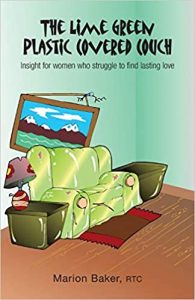
The Lime Green Plastic Couch
THE LIME GREEN PLASTIC COUCH
A: Why did you name your book: The lime green plastic couch?
M: That’s a really good question. That was another thing when I walked into my husband’s apartment. Cause when, when people see that title, a lot of people that are my age or older, say I remember those couches cause they were a thing in the fifties. It was like these lime green or maybe it was the sixties. I dunno, these couches horrible. Couch was covered in like lime green pleather. Basically I remember those and I’m like, no, that’s not it. And so I walked into this living room with this couch that was literally covered in a sheet of lime green plastic, and I was like, oh, why do you have that? Well, I heard, you know, Horacio down the hallway talking about bed bugs. And so that was his solution to not getting bed bugs. Was he wrapped, he was wrapping everything as much stuff as he could in plastic.
A: I could see why that would make sense to somebody.
M: For me personally, I would just move. But yeah, he liked where he lived and so he wanted to stay and that was his solution was. He has his own sense of aesthetic and I have mine and lime green plastic isn’t included.
A: And looking behind you I don’t see a lime green couch.
M: There is not one. No.
A: Where can people find your book?
M: So they can find it on Amazon. It’s called the Lime Green Plastic Covered Couch Insight for Women Who Struggle with Lasting Love. It can be for people who are in a relationship and are still struggling with boundaries or how to make the relationship work, or for women who are dating and just need to have more, you know, a bigger sense of how to move forward for them.
A: And the self-awareness part, especially when you’re trying to find a partner, if you’re only looking for within them and not within yourself. I think that that book would be very beneficial because you can’t find, like, say you had a, to do list or not as do list rather, but,
M: The list, I call it…
A: the list, The list of things that you want. I know we sort of touched on this before that a lot of times, those are actually things that maybe you don’t feel confident in yourself, or you need to find within yourself that a partner isn’t gonna, you know, fix or, that quota isn’t going to be okay, well, you have this, this and this, but all of these other great features or these great features will come with, other counterparts to them, right?
M: Yeah that’s right, you hit the nail on the head actually. Cause every, personality trait that we have comes with an upside and a downside, like say for example, your you know, one of those very type, a driven personalities, you’re a person you’re, I’m looking at one. Okay. There we go. So you’re going to accomplish a lot in your life. you’re never going to be at a loss, like feel incompetent or be at a loss for how to direct your life. You’re always going to be focused and driven and know the direction that you want to go. Where the downside of that is, is like maybe sometimes that’s not, what’s being called for in the moment. Maybe you’re going to burn yourself out and you need to learn how to, you know, take some deep breaths and meditate or go have a hot bath or. Maybe the, sometimes your drive takes you in the wrong direction, but you haven’t stopped long enough to say, hey, wait a minute, where what’s my plan? And is it working?
A: Well especially in our sort of like hustle culture, where people sort of romance this idea of having a long to-do list and, you know, getting through everything instead of sort of taking that time to reflect or just relax.
M: Yeah, I just, I once heard a quote by an Indian Sage and he got up in the morning and said, oh, I’ve got so much to do today. I better meditate for 4 hours. Because the minute that, that time that you spend actually clears your psyche and gives you more clarity with how you want to move forward.
A: For sure, we’re so busy, you can’t even stop to think right along communicate properly, or maybe see what’s really around you.
M: Yeah. There, there is information in that silence.
A: Do you think that when people are making the list, are there any red flag factors when you’re thinking of that list that people should go, oh, maybe I should question why that’s on my list.
M: Yes I covered that in my book. So, it reminds me of this movie. I can’t remember what it was called. Katherine Heigl was in it and I love her and she actually gave her list to her date on the first date. In this movie she’s like he liked white wine instead of red wine. She wanted a red wine drinker that was on her list. It’s like, you know in the big scheme of things, what difference does it make if he’s drinking water or wine and there also is, like you were saying, if you’re, if there’s some way that you’re expecting your partner to fulfill, oh, here’s another one I want to feel special.
A: Oh, and I feel like that, that we’re all supposed to be special and we’re all supposed to be picked the pretty pretty princess mode.
M: Yes, exactly. I want to feel special, but it like the catch is if you don’t feel special to yourself, no matter what a guy does is always going to fall short because you’re not going to see it that way.
A: That’s so true.
M: A guy can only give so many roses before, like the hole in you like never gets filled. So there’s those things that can’t come from somebody else. I actually tell people that to tear up the list and just follow what comes to them and their silence instead.
A: I think that expectation is really sometimes what can do us all in.
M: Right. Yeah. I mean, just like those eight years that I was desperate to get married, it was like, yikes. And it wasn’t until I just finally surrendered it and went, okay, I’m just going to stop and be still that suddenly what I wanted was handed to me.
A: And with marriage how you have it now, when you were thinking, I want to be married and this is how I want it to be. Is it what you pictured or is it totally different than your expectation?
M: Totally different than my expectation had I had a list, my husband would not have met any of the criteria.
A: Well, especially with the boxes and the couch.
M: Right? Because we meet on certain things and we don’t meet on other, certain other things and he wouldn’t have made my list.
A: Well, I’m happy you made one, or if you did that, you had tossed it. 11 years is fantastic.
M: Yeah. And I’m still happy. Like, I still am glad that I married this man. He’s kind, and he’s a good man and he’s a good person. I really appreciate him. And at the same time had I not had my own boundaries and come into this relationship. With boundaries. And when was talking about it and us continually working on that this relationship would have gone down the same toilet that any other, all of my other relationships went, because part of the reason that he is such a good husband to me in particular is because I’ve asked him to be.
A: Yeah I think a lot of the times too, we expect people to be mind readers or –
M: Yes oh my God.
A: Figure out all of our stuff and we really have to tell people what we want and what we feel and all of those things.
M: Absolutely.
THERAPY CAN BE ESSENTIAL TO HEALING
A: Which I think too many people nowadays, that they get stuck in that, and they don’t necessarily value their partner anymore and don’t know how to have those conversations. So I think it’s really important to understand that like therapy is awesome and it can help you and doesn’t have to be this like scary taboo. It’s not like, oh, something’s wrong with you? It’s like you can’t always fix your own problems because you just see can’t them.
M: Yeah I mean, therapy helped me in so many ways. Like I said, it helped me heal my relationship with my mom. It helped me actually be able to have a marriage, my sisters and I, like, I have three older sisters. We, we never spoke to each other and it wasn’t like we weren’t talking. We just never bothered. And because of me going to therapy, I actually re-engaged my family. It only takes one person to change the dynamic. So I went in and re-engaged my family and started getting them together for my mom’s birthdays and all that. So now that my mom has passed away, my family and I, we still all get together once a year for just a family reunion. And then the four of us girls, we go together on a holiday every year. Like we go to own a cruise or go to Mexico, or so we are now we have, we even have our own, like texting group. It just has changed my life in so many ways. Particularly in the area of relationships, because that’s where life happens.
A: Well and that is so powerful and it’s so important to have, I think sometimes the validation, I think sometimes when other people just hear that it’s worked for other people, then I feel like it helps them feel more comfortable in knowing that change is possible and that there are solutions you don’t have to feel stuck or trapped in a relationship.
M: Yeah.
A: Say somebody is in a situation where they have a mom or a partner or a family member, or a friend similar to your mom, and they just couldn’t see it on their end of not being respectful in their boundaries. How would you tell that person, or what advice would you give them on maybe breaking up with that person or sort of being firm in their boundaries so that they can be healthy moving forward.
M: Yeah. I mean, I, as a counselor, I don’t tend to give advice and, and like, I would never tell a person go and break up with that person, but what I would do is point out I would educate them on, on what, like I’ve got this model that I have of an egg. And an egg is a hundred percent of the relationship and down the middle line is half of you and half of the other person, then that’s the 50% line, which has helped what I call healthy. And so I just get the person to identify where they go over the line or where they’re way under the line and where their per their relationship goes over the line, their partner, or the whoever they’re in a relationship with goes over the line and under the line. And then they get to decide. If they’re ready and how they’re going to step up to the line like me with my mom, I had to actually step up. Cause every time she would get angry, I would, I would shy away and not say anything and go into myself. And I actually had to step up to the line with her and say, hey wait. And so, or if you’re a person that tends to go over the line, you’ve got to like pull that in and restrain yourself. And it’s only when you get to that place, that middle line of healthy. And you’re saying to your partner, like, I teach people, you know, say to your partner, here’s what I want. This is the sandbox. I want to play in, do you want to come? And if they say with their words or, and or their behavior that they do and they do, they start to, and they’re willing, then you’ve got a partner that’s worth sticking with. And if they don’t and they just ridicule you or make you feel bad about yourself, because you’re setting this boundary, then that’s not been people get to see that it becomes really clear and people get to see who they’re with because when you set a boundary, you really get to see who you’re in a relationship with.
A: I think the boundary setting, especially in the covid times that we’re in and there is such a difference of opinion, whether it’s vaccine, vaccine, passports, whatever the case may be but I think there’s a lot of people that are trying to change the other person’s mind, whether it’s a friendship or a family or romantic partner, but I think it’s really important for people to note on that, that it doesn’t have to be. You Bite your tongue, 80% of the time. And the person gets to convince you that they’re right. The other 20, that it’s really important to remember in relationships. Everything should be 50/50.
M: And, and, and not even always like, you know, as long as you’re in agreement, like if it’s, if it’s always a fight, then you’ve got a problem. But like, if you’re in agreement that, you know, like, for example, my husband likes being out in the garden and doing the garden and stuff like that. And he likes watering the plants. So I’m like, great. I’ll cook you dinner. And just as long as I’ve got a dishwasher, I’m good. So, you know if I do pink jobs and he does blue jobs, as long as you’re in agreement, you’re fine. So sometimes there might be a 60/40, or sometimes it might be 70/30 if there’s a flow and not one person doing all the giving and one person doing all it takes. And that’s, you know, that’s another problem is that it’s a generalization, but when women tend to be the givers, oh, I’ll cook him dinner or I’ll do this. So I’ll be the one to sacrifice. And it’s like, no, that’s not okay.
A: No, it shouldn’t be all the time. Well Marion, thank you so much for all this advice that you’ve shared with us and all of your wisdom. Do you have a website or social media channels? Where can people find you?
M: They can find me on Facebook at Ravenstone, Wealth and Wellness, and they can also find my website Ravenstone Counselling.



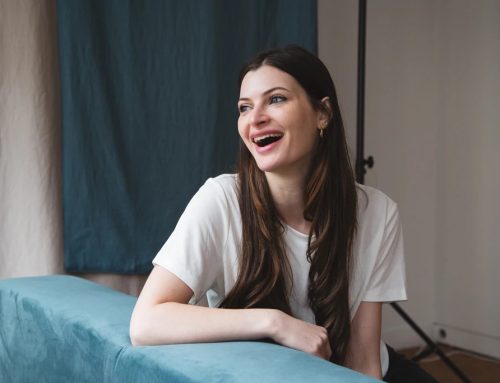
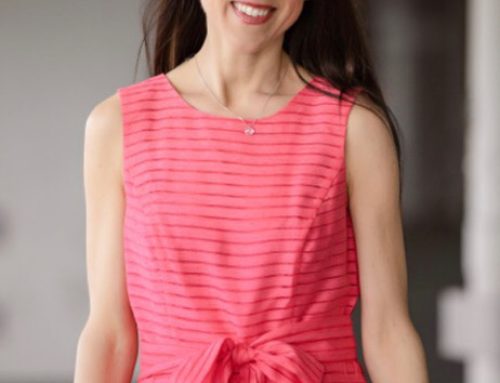
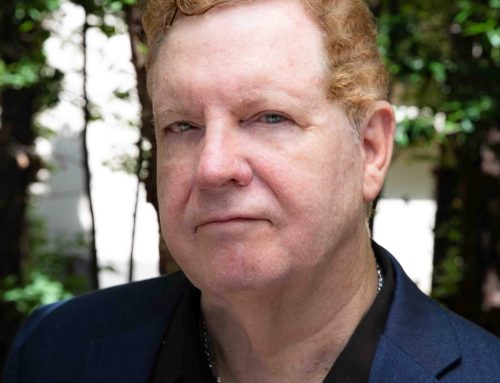
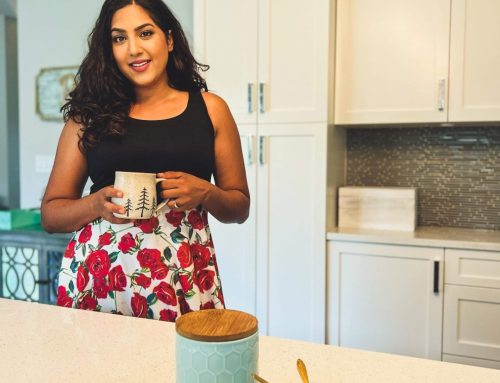
Leave A Comment